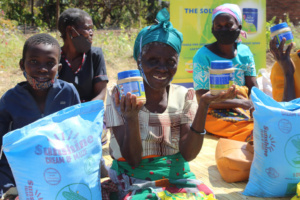
Malnutrition in Malawi is a major contributor to child deaths and up to 37% of children suffer from stunted growth, the consequence of micro-nutrient deficiencies.
In many instances, adults attending village clinics present with BMIs as low as 14.1, which by any standard, is painfully underweight. This has the effect of preventing individuals from working effectively in order to sustain themselves and their families.
Nutrition Care Support and Treatment (NCST) in Malawi targets the grossly underweight who, through the treatment, receive a well-rounded emergency package, which includes a monthly food parcel, a high energy food supplement and corn soya blend porridge.
Amongst patients treated are many diagnosed with HIV/Aids, TB and Cancer, whose conditions would fail to improve due to their severe hunger.
The programme operates within 13 clinics in the Blantyre District, inclusive of the Burns Unit at Queen Elizabeth Central Hospital, where 640 patients are being treated monthly. The programme, run in partnership with the country's Ministry of Health, also reaches out a Cancer Palliative Care Clinic in the Salima District, where 160 malnourished patients are treated every month.
In 2020, we successfully reached 817 patients, successfully discharging 389 patients who recovered as a result of our intervention, while 428 patients currently remain on the programme.
Included in the treatment regime, is the regular assessment of patients and the provision of psycho-social support to assist in their overall road to recovery.
The Sibusiso Ready Food Supplement was specifically formulated for severe cases of malnutrition and is effective where there exists muscle wasting, low energy levels, nutritional challenges, weakness and decreased appetite.
Our monthly food parcels support not patients but their families as well until the patient has fully recovered and is capable of working again.
With agriculture being the primary source of food and income in Malawi, successfully combating malnutrition means that adult patients may again be re-integrated into the rural workforce.